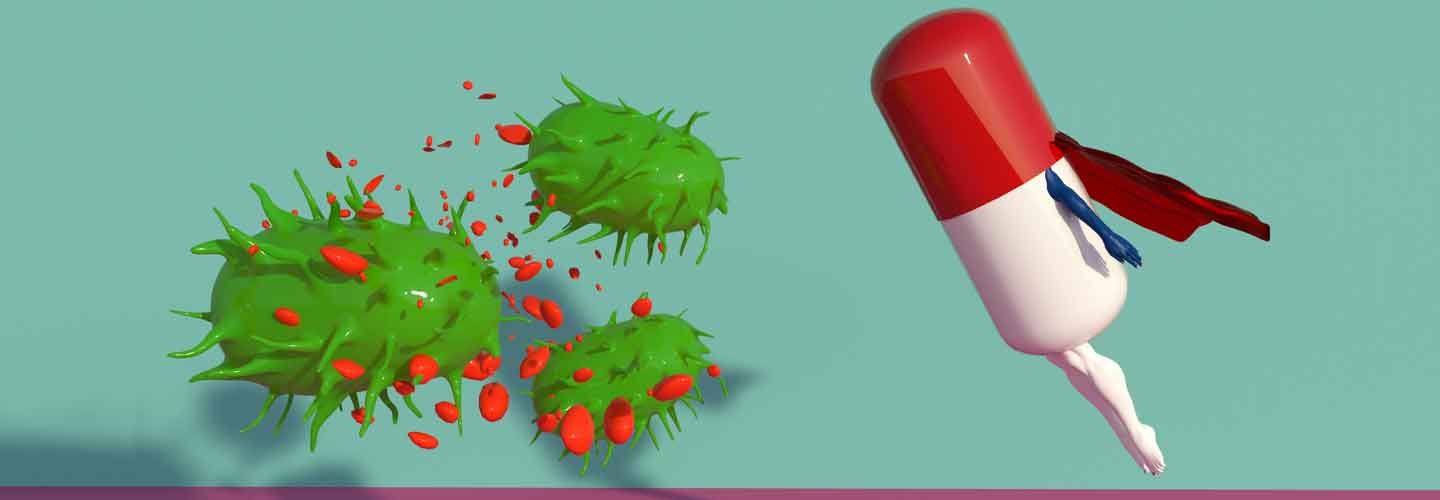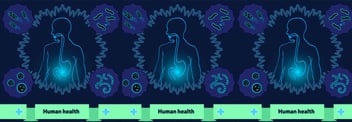Your Mighty Moody Microbiome – Part 10 “Powerful Superhero—Mr. Probiotic—Kills Evil Depression Bugs!”
- Home
- Blog

Reader, there’s a common trope in crime movies and television shows that you may be familiar with. Picture this: after a long search, the “Good Guy” detective (or cop or other seeker of justice) finally finds the “Bad Guy” criminal (or fugitive or other person of interest). Perhaps they’re alone in a dark alley. As they size each other up, the Bad Guy starts menacingly moving forward the Good Guy—he sees himself at an advantage. But the Good Guy has a secret weapon—his walkie talkie. Fearfully, and with shaking hands, he presses the call button and mutters, “I’ve found the Bad Guy—but I’m going to need some back up over here…” Just as the Bad Guy pounces, allies of the Good Guy swoop in and overtake the criminal! He’s outnumbered! In an explosive climactic scene, justice wins—and the world is safe for another day.
Lots of movies make it look so simple to take out the bad guy—but there’s another variation of this trope where the “bad guy” isn’t so simply defined. Like the mythological hydra (or the villains in big franchises like Avengers or Mission Impossible), you might cut off one head only to find three more growing in its place. Often, when it comes to our mental health, the Bad Guy is more hydra than one-off character. When it comes to fighting depression, “send in the back-up!” has often meant deploying an anti-depressant directed at the neurotransmitters in the brain. But the future of mental-health “back-up” may be in a different sort of pill—one filled with real-life “fighter bacteria”, rather than chemicals. By bolstering your microbiome, probiotic supplements may just play a critical role in fighting off the hydra of depression once and for all. Let’s take a look at the new “Good Guys” and how they can strengthen our mental health outcomes!
The Hydra of Depression—And How the Microbiome Comes into Play
As we discussed last week, depression is increasingly being discussed in the news and portrayed in pop culture. Bringing awareness to the realities of this mental illness is crucial in our collective fight to understand and manage its impacts—because this is an illness that’s only projected to grow in the coming years. Depression already affects almost 400 million people across the globe. Approximately 20% of the population will suffer from it at some point in their lives. Major Depressive Disorder is already one of the largest causes of health-related disability, as well as one of the costliest of all the mental health disorders—and rates are increasing among younger individuals.
For Many Who Suffer from Depression, Antidepressants Simply Don’t Work
Yet, despite its global precedence, treatment of depression remains frustrating elusive for many—up to 60% of patients suffering from depression don’t see any improvement from the most common pharmacological treatments targeting neurotransmitters. SSRIs and SNRIS simply don’t work for the majority of patients suffering from depression! Over and over again, I’ve seen patients who all want to know: Why is treatment so difficult—and why do they remain treatment-resistant, after seemingly trying everything?
There is No Such Thing as Depression—There are Many “Depressions”
The reason is deceptively simple: Depression is not a single bad guy—it’s a hydra. There are many “depressions” and the unique underlying contributors for each depressed individual, her or his genetic and epigenetic causes, need to be uncovered and addressed in a thoughtful, systematic way. Unlike what so many believe, depression does not just live in your brain—although it certainly takes up residence there as well. It also lives in your HPA axis, your immune system, and in your gut. Let’s take a quick look at each of these four “heads” of the hydra of depression:
- In your brain, low levels of neurotransmitters like serotonin, norepinephrine, and dopamine can play a role in depression. Treating those with SSRIs, SNRIs, NDRIs, or Multi-Modals can bring some improvement—but for many, antidepressants alone aren’t the only answer, because their depression lives on in one of the three other “hydra heads”.
- Your hypothalamus-pituitary-adrenal axis plays a critical role in your response to stress—so it’s easy to see how a dysregulated HPA axis may lead to complications. When your HPA axis is over-active, it can lead to higher levels of stress hormones pulsing through your body, and those hormones can also impact your depression. These stress hormones also harm your microbiome.
- Your immune system is meant to keep you healthy—but many depressed patients exhibit dysregulated immune systems, and chronic inflammation may be to blame. As we’ve discussed in prior blogs, chronic inflammation can wreak havoc on our mental and physical health. And in our brain, as our microglial cells become activated and drain surrounding neurons of their energy resources, those “underpowered neurons” contribute to the emotional, cognitive and behavioral manifestations of depression.
- Last but certainly not least, depression can live and breed in your gut—and thanks to what we now know about the gut-brain axis and the ways in which those two command centers are able to communicate with each other, if your microbiome is dysregulated, your mental health will likely suffer the consequences.
As you can see, depression is a complex, whole-body illness which can manifest in different ways in different people. Successful treatment must be tailored to the individual’s unique genetic makeup and epigenetic needs—but in many cases, success means treating not just one part of the hydra but many. And that’s where probiotics come in—because if we’ve learned anything from this series, it’s that our Mighty, Moody Microbiome is a powerful and distinct force in our bodies—and sometimes, sending for backup to reign in a dysregulated microbiome is the missing piece of the puzzle that many patients have been looking for.
Why Probiotics are Your Gut’s Ultimate Superhero Ally
Here’s another common trope in those “bad guy” movies and TV shows: one bad guy in a group of villains doesn’t really belong. Perhaps he started out good, and something along the way brainwashed him into thinking he, too, was an evil force. These bad guys are sometimes the most susceptible: they just need to be reminded of their goodness—and the good guy doing the reminding often has a secret quality that makes them more trustworthy. In Marvel’s Captain America, the character of Bucky was once known as Steve Roger’s (The Captain himself) best friend and ally. But literal brainwashing turned him to the dark side—and only Steve could turn him back, reminding him who he really was. In our very own bodies, the gut bacteria comprising our microbiome can be a force of good or evil. But when our microbiome is dysregulated, the “good guys” that can swoop in and save it from the dark side are bacteria themselves! Probiotics are defined as “live microorganisms which, when administered in adequate amounts, confer a health benefit on the host.” These live organisms can give your dysregulated gut a strong, positive message to shape up and behave.
Studies have shown that the microbiomes of depressed individuals are qualitatively different than the microbiota in healthy people. Studies have also shown that fecal transplants of microbiota can also “transplant” depressive symptoms from organism to organism. Lastly, study after study has shown that the impact of probiotics in treatment of depression have been so notable that some are moving to call these little bacteria “psychobiotics” rather than “probiotics” to reflect their incredible impact on our mental health. The gut-brain axis is bidirectional—meaning that your gut sends messages to your brain just as your brain sends messages to your gut. Feeding your gut good bacteria through probiotics can improve dysbiosis—and your gut will relay its newfound “good guy” status straight to your brain!
Probiotics + Your Gene Variants = A Roadmap to Good Health
Certain genetic variants may predispose to a greater need for probiotics, given their negative effects on the microbiome. For example, in Genomind’s Mindful DNA Professional, the FUT2 gene affects the surface receptors in your gut that allow for the attachment and growth of intestinal microbes and provides an important food source for healthy gut bacteria. If you have a resilient FUT2 gene, your surface receptors are robust, and you have more potential for a diverse—and thus healthy—microbiome. If you have a risk gene, however, you likely have a lower diversity and possible dysregulation of gut microbiota. Those with the risk variant have a 7-14% increased risk of inflammatory GI conditions like Celiac disease or Crohn’s disease. In addition Mindful DNA tests for HLA-DQ2/HLA-DQ8 genes that put you at increased risk of suffering from Celiac disease. The DQ2 and DQ8 haplotypes (genes inherited from a single parent) are strongly associated with the disease, and the DQ5 haplotype is carried in 90-95% of all Celiac patients. This disease can impact your entire body, from your energy levels to your brain functions—and the sooner you know whether you suffer from a gluten sensitivity, the sooner you can make those gluten-free changes to your diet to feel better. In addition, probiotics may help lessen the impact of dysbiosis that was induced by gluten-promoted intestinal inflammation.
Sometimes we could all use a little superhero back-up when fighting off the “bad guys”. And when it comes to the “bad guys” causing our depression, probiotics can be a huge addition to the “good guys” team. There’s plenty we still have to learn about the administration of probiotics in treatment of depression—but in my own experience as a psychiatrist who evaluates and treats the Whole Person, treating my patients’ guts in addition to their brains has not uncommonly led to significant improvements in their mental health.
Related Information
Where can I get tested?
Learn More about Genomind and Genetic Testing
Learn More about Potomac Psychiatry
.png?width=144&height=144&name=Untitled%20design%20(34).png)



